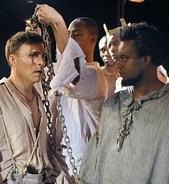SITE GUIDE
SEARCH
REVIEWS
REVIEW ARCHIVES
ADVERTISING AT CURTAINUP
FEATURES
NEWS
Etcetera and
Short Term Listings
LISTINGS
Broadway
Off-Broadway
NYC Restaurants
BOOKS and CDs
OTHER PLACES
Berkshires
London
California
New Jersey
DC
Philadelphia
Elsewhere
QUOTES
TKTS
PLAYWRIGHTS' ALBUMS
LETTERS TO EDITOR
FILM
LINKS
MISCELLANEOUS
Free Updates
Masthead
A CurtainUp Review
Benito Cereno
|
Yankee Master understand me. The future is with us.
--Babu
|

(l-r): Rafael De Mussa, Keith Trent, Uchenna Onyla, Frank Mayers and James Jorsling
(Photo: Stephanie Berge) |
In its first revival since 1976, Horizon Theatre Rep’s Benito Cereno (with Robert Lowell’s 1965 Obie-winning script based on Melville’s novel) tries to tap into this power, with occasional success. Yet the problem of pacing remains, and it plagues the show for most of its ninety minute running time.
On the surface, the strangeness of the story ought to maintain interest by itself. Captain Amasa Delano (Arthur Bartow) commands the President Adams, an American merchant vessel at anchor off the coast of Trinidad which comes into contact with the San Domingo, a Spanish ship with a nearly all-black crew—all except for its white captain, Benito Cereno (Rafael De Mussa, also the artistic director of the Horizon).
The San Domingo is practically adrift, with no real sailors to man her; the blacks on board are all former slaves, supposedly freed by one of the ship’s former co-owners and now under the nominal control of Cereno. Cereno himself is almost as adrift as his ship, incoherent and rambling, and it is only his servant Babu (Jaymes Jorsling) who keeps him together. Or so it appears. As Delano and his fresh-faced mate John Perkins (Benjamin Thys) soon realize, there’s more going on than meets the eye, and discovering exactly what could prove dangerous.
With that kind of a summary you’d think the play couldn’t miss, and indeed there are a number of interesting moments. Director Woodie King Jr. has some compelling interpretative insights, and some of the set pieces—such as the “entertainment” Babu and the other blacks on board show to Delano and Perkins—are both intriguing and startling. And the actors themselves, particularly Frank Mayers as King Atufal and Jorsling, balance their characters’ rage and desperation almost perfectly. When Babu says near the play’s conclusion that the “future is with us,” the audience is inclined to believe it.
These charged moments are few and far between, and all too often the drama created in them is almost immediately drained by yet another interminable exchange between Delano and Perkins about early nineteenth century American politics, or some long pause as Cereno gazes awkwardly out to sea. Even the dialogue seems wooden at these moments, as if the actors are anxious to pay proper reverence to Melville’s concept and Lowell’s script. Since this isn’t a witty comedy by Shaw, the effect on the narrative isn’t flattering. The narrow stage doesn’t help. It consists of essentially only two sections — the deck of the ship and Cereno’s cabin. The potential for more creative staging (a cutout in the back wall allows people to pass back and forth, their expressions silently commenting on the scene in front of them), it’s very seldom put to use.
Considered as a whole, it Benito Cereno adds up to a series of missed opportunities, and that’s a shame. The several excellent performances and genuinely powerful moments come along too infrequently and are too often reduced in impact. Towards the end of the play, one of the female ex-slaves gives a bloodcurdling cry of horror at an event she has just witnessed. But by then the audience isn’t invested and the reaction is more of disinterest than shock—a microcosm of the play to that point.
While this is by no means a bad production, it’s a mostly passive one. Something that draws upon Melville’s forceful vision could have done more.
>
|
Benito Cereno Playwright: Robert Lowell (based on a novel by Herman Melville) Director: Woodie King, Jr. Cast: Mutiyat Ade-Salu (Virgin Mary/Queen Ramatoulaye), Arthur Bartow (Amasa Delano), Ama Birch (Fanta), Rafael De Mussa (Benito Cereno), Abdil Ismail (Kimbo), Jaymes Jorsling (Babu), Frank Mayers (King Atufal), Rowan Michael Meyer (Sailor), Uchenna Onyia (Uhuru), Reynaldo Piniella (Francesco), Pedro Rezende (Spanish Sailor), Akintunde Sogunro (Mawdo), Sean Christian Taylor (Sailor), Benjamin Thys (John Perkins), Keith Trent (Olakunde) Set Design: Chien-Yu Peng Lighting Design: Joyce Liao Sound Design: Jon Bremner Costume Design: Cathy Small Choreographer: Bruce Heath Running time: One hour, twenty-five minutes with no intermission Horizon Theatre Rep @ The Flea Theater, 41 White Street, (212) 352-3101 Website: http://www.theflea.org From 9/22/11 to 10/16/11; opening 9/25/11 Tues.-Sat. @ 9 p.m., Sun. @ 7 p.m. Tickets: $18 Reviewed by Dr. Gregory A. Wilson based on September 22nd press preview performance |
|
REVIEW FEEDBACK Highlight one of the responses below and click "copy" or"CTRL+C"
Paste the highlighted text into the subject line (CTRL+ V): Feel free to add detailed comments in the body of the email. . .also the names and emails of any friends to whom you'd like us to forward a copy of this review. Visit Curtainup's Blog Annex For a feed to reviews and features as they are posted add http://curtainupnewlinks.blogspot.com to your reader Curtainup at Facebook . . . Curtainup at Twitter Subscribe to our FREE email updates: E-mail: esommer@curtainup.comesommer@curtainup.com put SUBSCRIBE CURTAINUP EMAIL UPDATE in the subject line and your full name and email address in the body of the message. If you can spare a minute, tell us how you came to CurtainUp and from what part of the country. |
 Anything Goes Cast Recording
Anything Goes Cast RecordingOur review of the show
 Book of Mormon -CD
Book of Mormon -CDOur review of the show

Slings & Arrows-the complete set
You don't have to be a Shakespeare aficionado to love all 21 episodes of this hilarious and moving Canadian TV series about a fictional Shakespeare Company

